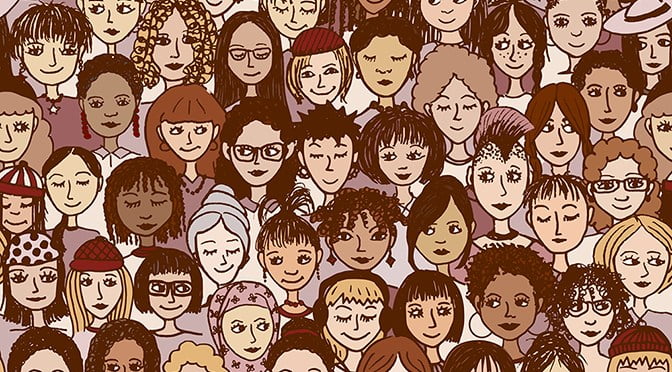Editor’s Note: This month, that is February 2020, FII’s #MoodOfTheMonth is Feminism and STEM. We seek to challenge the exclusionary biases in the field, by inviting various articles on the works of women, queer individuals, and people from marginalised communities in STEM, the ways in which the sciences are biased, stereotypes and misconceptions in STEM, and the experiences of people from marginalised identities in the field. If you’d like to share your story, email us at maduli@feminisminindia.com.
A seminal book by two strong phenomenal women, Susan Gubar and Sandra Gilbert, Mad women in the Attic looks at the reductive representations of women in Victorian literature. Female characters (largely heterosexual and white) were represented in this vibrant era either as docile and fragile bodies ready to collapse at the first sight of the sun, or monstrous, rebellious man-haters. This misrepresentation is not just characteristic of this time. It is a product of years of hard labour of the patriarchy, which left no stone unturned to concretise these perceptions. Be it medicine, advertisement or social norms — it plagues all.
Medicine, in popular consciousness, is one of the most benevolent professions. The word ‘science’ itself assumes the position of penultimate truth in today’s consumerist economy. However, science and medicine, like any other institutions, are plagued with a big dash of sexism and doses of profit obsession. It is another ideology that was and is created by a few people: usually white, upper class males. It gains popularity through a very elaborate marketing scheme. Let’s look at this dangerous fusion in the field of psychology.
‘hysteria’, a disease apparently exclusively suffered by females due to their ‘over-dramatised’ temperaments and ‘wandering womb’, was used to silence women for centuries.
Psychology, a scientific study of the human brain, has witnessed misogynistic studies through its history, bordering on the absurd. For instance, ‘hysteria’, a disease apparently exclusively suffered by females due to their ‘over-dramatised’ temperaments and ‘wandering womb’, was used to silence women for centuries. Women were kept in the confines of their homes by being labeled hysteric and ineffective. They were barred from attending universities, studying medicine or taking up important posts as they were considered emotionally unstable, essentially turning them into ‘caged prisoners of the attic’. Multiple psychological studies generously supported such claims.
Also Read: To Choose Or Not To Choose Science: Gendering Of Higher Education
In fact, hysteria stayed intact in the Diagnostic and Statistical Manual of Mental Disorders until the 1950s. Another psychologist, who is greatly studied and regarded, Sigmund Freud, was no exception to this rule. He is not only known for bringing psychological principles to clinical studies, but also to have formed the theory of ‘penis envy’. According to this theory, girls go through a phase of insecurity and deficit in their early days when they realise that they lack this protruding male organ. This makes them feel inadequate and initiates their process of domestication. Indeed, Freud was a product of his time, which witnessed the foundation of multiple psychological schools of thought, which have percolated into our times too. It is still believed that neurotic tendencies are more in women and this reflects in multiple personality tests that professionals use. Consequently, women are more likely to be prescribed high doses of medicine and are more likely to be confined in separate institutions!
In fact, female psychologists are also systematically invisibilised from academic books and syllabuses. A friend of mine studying Psychology at Lady Shri Ram College told me, “The first time I studied about a female psychologist was about her not being allowed inside William James’s class, the pioneer of Functionalist psychology.”
On one level, we can look at these skewed statistics as a reflection of the society we live in, i.e marginalised genders do experience multiple layers of discrimination and othering, which takes a heavy toll on their mental health. On another level, there is a valid sociological perspective as well, which looks at the very construction of illness and disability. Who is healthy and who is not? More importantly, who decides the same? The idea of well-being, both mental and physical, is rooted in our societal values. When people conform to the norm, the expected and the “respectable”, they are perceived as a healthy element of the society. By extension, a subversive voice is labelled diseased and abnormal.
At one point in time, vocal women were deemed delusional and feminine qualities were called childish.
It is these values that tell us which woman is feminine or not, which sexuality is healthy and diseased, and which frame of mind is acceptable. It is these values which label body types, pathologise emotions and dictate taboos. At one point in time, vocal women were deemed delusional and feminine qualities were called childish. Further, homosexuality became a disease and now, emotional upheavals due to period pains are looked at through a pathological lens. Such prejudice finds its root in the perception of normal: normal for patriarchy is a normative, heterosexual man. If one doesn’t fit in it, it uses psychiatry, money and brute power to force the fitting.
Also read: How Mary Shelley Critiques Patriarchy And Science In Frankenstein
An American Psychological Association report published in Science for Society and the Public, Volume 107, shows a psychologist practicing these misguided values:
“My feminism was questioned by a male therapist colleague when I disagreed with him over marital and child-rearing principles… All psychologists I had were males. Several of them made jokes about and/or ridiculed the work, writing, research and ideas of women who presented opposing ideas to those advanced by males (eg., any question of “penis envy” was treated as a joke)” – An APA member.
Featured Image Credits: psychlearningcurve.org





Goooo Tayyaba, my favorite bro